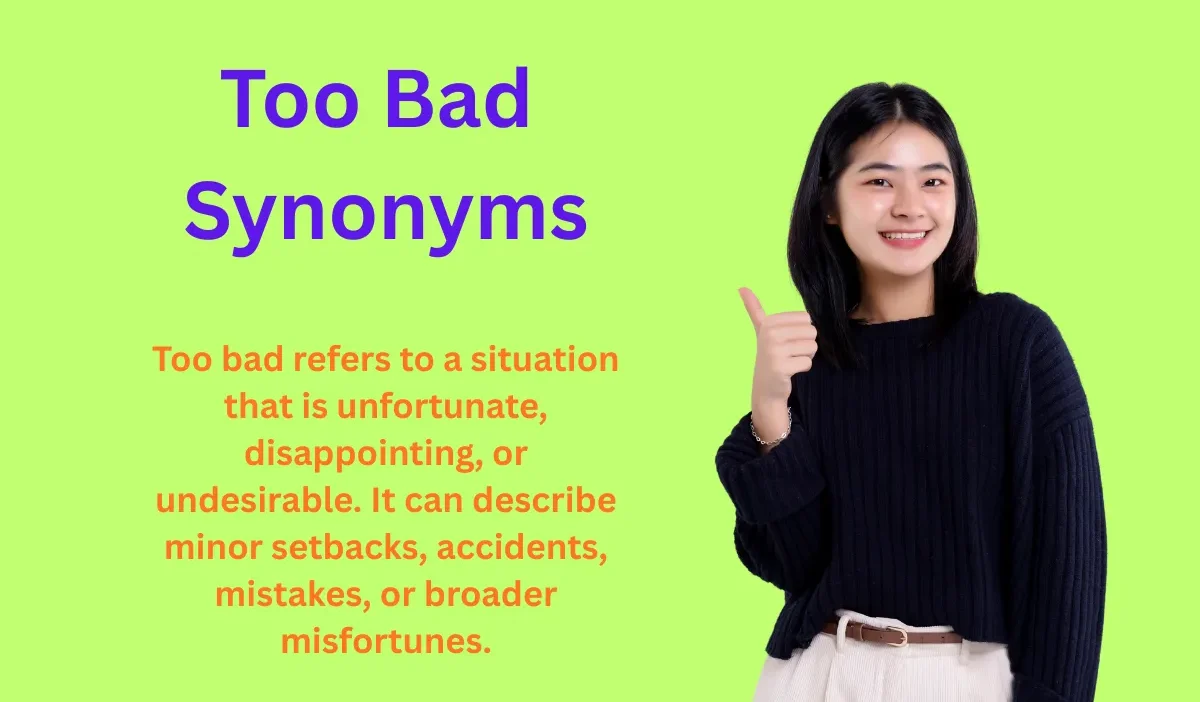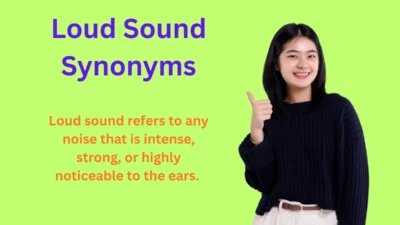Too bad synonyms, such as unfortunate, regrettable, disappointing, and unlucky, capture different nuances of negative outcomes, misfortune, or unfortunate circumstances. For example, unfortunate emphasizes circumstance beyond control, while regrettable highlights remorse or pity. These words help writers, storytellers, and communicators describe situations with clarity and nuance.
If you’re writing about life events, storytelling, casual conversations, or formal writing, choosing the right synonym lets you strike the perfect tone—sympathetic, casual, or formal. In this guide, we’ll explore multiple ways to express “too bad” and when each term fits best.
These synonyms of too bad not only enrich your expression but also help you convey emotion, regret, or disappointment. From everyday interactions to literary storytelling, the phrase reflects misfortune, sympathy, and consequence.
What Does Too Bad Mean?
Too bad refers to a situation that is unfortunate, disappointing, or undesirable. It can describe minor setbacks, accidents, mistakes, or broader misfortunes.
The term “too bad” can describe:
- Situations causing disappointment
- Events beyond one’s control
- Mistakes, regrets, or unfortunate outcomes
Too bad isn’t just casual phrasing—it conveys empathy, regret, or acceptance.
Synonyms & Related Words for Too Bad (1–30)
1. Unfortunate
Meaning: Marked by bad luck or undesirable outcome
Example: “It’s unfortunate that the event was canceled.”
Use when: Neutral or formal tone.
2. Regrettable
Meaning: Causing regret or sorrow
Example: “His early departure was regrettable.”
Use when: Emphasizing pity or remorse.
3. Disappointing
Meaning: Failing to meet expectations
Example: “The movie was disappointing compared to the reviews.”
Use when: Casual or formal situations.
4. Unlucky
Meaning: Experiencing bad fortune
Example: “She was unlucky to miss the train.”
Use when: Informal, emphasizing chance or misfortune.
5. Sad
Meaning: Causing sorrow or regret
Example: “It’s sad that they couldn’t attend the ceremony.”
Use when: Casual or emotional tone.
6. Pitiful
Meaning: Evoking sympathy or sadness
Example: “It’s pitiful that the puppy was abandoned.”
Use when: Literary or empathetic tone.
7. Lamentable
Meaning: Worthy of grief or regret
Example: “His treatment of the project was lamentable.”
Use when: Formal or literary context.
8. Awful
Meaning: Very bad or unpleasant
Example: “It’s awful that the weather ruined the picnic.”
Use when: Informal, casual context.
9. Distressing
Meaning: Causing anxiety, worry, or sorrow
Example: “It was distressing to hear about the accident.”
Use when: Emotional or formal tone.
10. Tragic
Meaning: Extremely sad or disastrous
Example: “The fire was a tragic event for the town.”
Use when: Serious, dramatic situations.
11. Miserable
Meaning: Very unhappy or unpleasant
Example: “It’s miserable that the trip was canceled.”
Use when: Casual, emotional tone.
12. Wretched
Meaning: Deeply unfortunate or miserable
Example: “It was a wretched mistake that cost the team.”
Use when: Formal or literary context.
13. Deplorable
Meaning: Shockingly bad or regrettable
Example: “The living conditions were deplorable.”
Use when: Formal or strong criticism.
14. Lousy
Meaning: Informally bad or disappointing
Example: “It’s lousy that the concert was postponed.”
Use when: Casual, everyday speech.
15. Unwelcome
Meaning: Not desired or pleasing
Example: “The news was unwelcome to everyone involved.”
Use when: Neutral or formal tone.
16. Miserable
Meaning: Causing unhappiness or discomfort
Example: “It’s miserable that we missed the deadline.”
Use when: Emotional or reflective tone.
17. Hopeless
Meaning: Without hope or prospects
Example: “It’s hopeless trying to fix the broken equipment.”
Use when: Casual or dramatic situations.
18. Frustrating
Meaning: Causing annoyance due to difficulty or failure
Example: “It’s frustrating that the package hasn’t arrived yet.”
Use when: Casual or relatable tone.
19. Unfavorable
Meaning: Not advantageous or positive
Example: “The weather conditions were unfavorable for hiking.”
Use when: Formal or neutral contexts.
20. Inopportune
Meaning: Happening at an inconvenient or bad time
Example: “His arrival was inopportune during the meeting.”
Use when: Formal, precise language.
21. Ill-fated
Meaning: Destined for misfortune
Example: “The ill-fated expedition never reached its goal.”
Use when: Literary or historical context.
22. Sadistic
Meaning: Causing misfortune in a cruel way
Example: “It’s sadistic to celebrate someone’s failure.”
Use when: Strong moral or critical tone.
23. Unhappy
Meaning: Not happy; causing sorrow
Example: “It’s unhappy that they had to cancel the festival.”
Use when: Casual or neutral tone.
24. Regretful
Meaning: Expressing remorse or disappointment
Example: “He was regretful about missing the meeting.”
Use when: Emotional, reflective tone.
25. Disastrous
Meaning: Causing great damage or misfortune
Example: “The flood had disastrous consequences for the town.”
Use when: Serious or dramatic context.
26. Woeful
Meaning: Full of sorrow or misfortune
Example: “It was a woeful decision that affected many.”
Use when: Literary or formal tone.
27. Pitiful
Meaning: Evoking sympathy or regret
Example: “The pitiful state of the shelter shocked volunteers.”
Use when: Emotional, empathetic tone.
28. Regretted
Meaning: Worthy of regret or disappointment
Example: “It was regretted that the event was poorly organized.”
Use when: Formal or reflective tone.
29. Bad Luck
Meaning: Unfavorable fortune or outcome
Example: “It was bad luck that the flight was delayed.”
Use when: Casual, everyday context.
30. Unfortunate Incident
Meaning: An event causing misfortune or disappointment
Example: “The cancellation was an unfortunate incident for the attendees.”
Use when: Formal, descriptive writing.
Choosing the Right Synonym
When selecting a synonym for too bad, consider:
- Tone: Casual (lousy, bad luck), formal (regrettable, lamentable), or emotional (sad, distressing)
- Context: Everyday setbacks, dramatic events, or literary/emotional writing
- Intensity: Choose tragic, disastrous, or deplorable for strong misfortune; unlucky or disappointing for minor issues
- Formality: Casual writing allows too bad, bad luck, or lousy; formal writing favors regrettable, lamentable, or unfortunate
Conclusion
Too bad is more than a casual phrase—it conveys misfortune, disappointment, and regret. Its synonyms, from unfortunate to disastrous, allow you to match tone, context, and intensity. Whether describing minor setbacks, serious events, or emotional situations, each synonym highlights a different aspect of negative outcomes.
By understanding nuance, tone, and context, you can choose the perfect word for too bad, making your writing empathetic, precise, and expressive.



